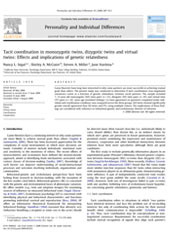 |
Tacit coordination in monozygotic twins, dizygotic twins and virtual twins: Effects and implications of genetic relatednessGame theorists have long been interested in why some partners are more successful at achieving mutual goals than others. The present study was conducted to determine if tacit coordination (non-negotiated consensus) varies as a function of genetic relatedness between social partners. The sample included 7–13-year-old monozygotic (MZ) twin pairs (n = 53), dizygotic (DZ) twin pairs (n = 85) and virtual twin (VT) pairs (n = 42; same-age unrelated siblings). Co-twin agreement on questions completed under individual and coordination conditions was compared across the three groups. MZ twins showed significantly greater overall agreement than DZ twins and VTs, using multiple criteria. The implications of these findings are considered with reference to behavioral-genetic and evolutionary theories of behavior. Get the article from sciencedirect.com |
Dr. Nancy L. Segal
